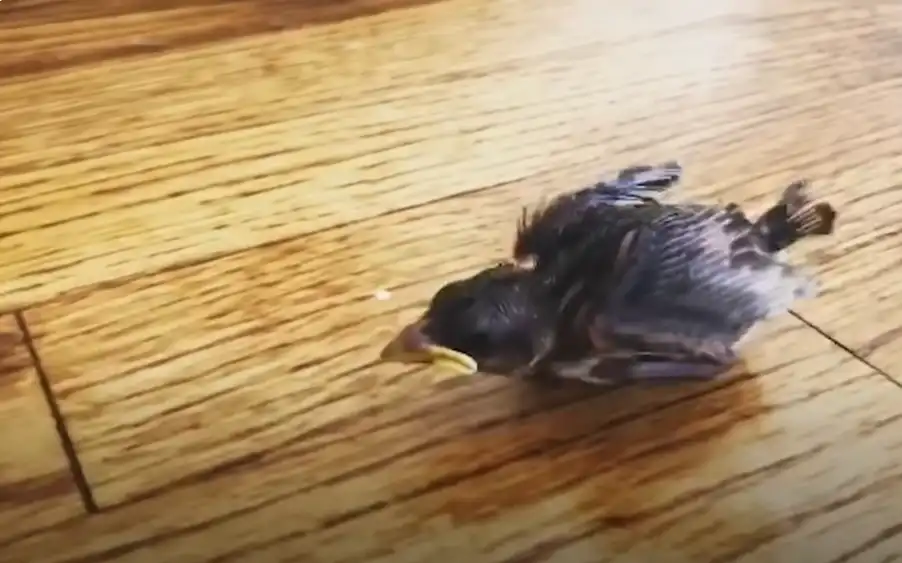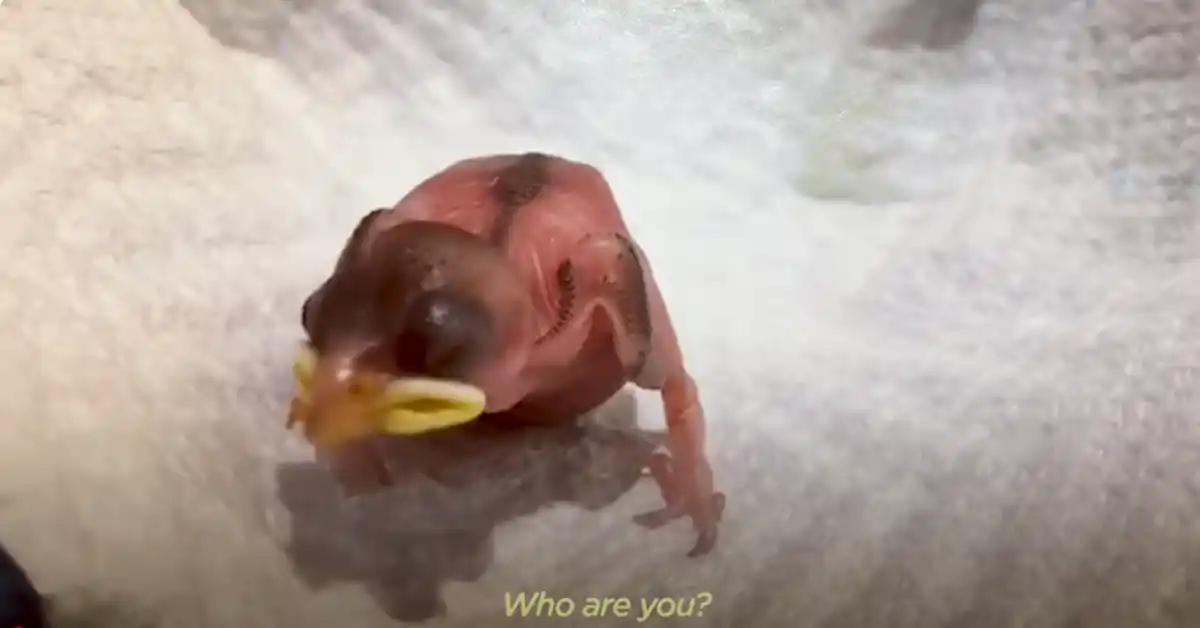Baby bird on the ground what to do can be a stressful question when you find one. Some need urgent help, while others should be left alone. In a few steps, you can tell the difference, protect the chick, and give it the best chance of survival. I’ve helped many in my garden, and I’ll share exactly what works in real life.
Baby Bird on the Ground – What to Do
Short answer: Not all baby birds on the ground need saving. The first step is to figure out if it really needs help.
- Check if it’s a nestling or a fledgling
- Quick tip: Nestlings (no feathers, pink skin, closed eyes) need immediate help. Fledglings (small feathers, hopping around) are usually learning to fly and should be left alone.
- From my own experience: I once found a tiny bird under a mango tree with no feathers. I knew right away it was a nestling, so I gently returned it to its nest. The mother came back within minutes.
- Quick tip: Nestlings (no feathers, pink skin, closed eyes) need immediate help. Fledglings (small feathers, hopping around) are usually learning to fly and should be left alone.
- Look for the nest
- Quick tip: If you see a nest nearby, gently put the bird back. The parents won’t reject it just because you touched it.
- Personal moment: I used to think human scent would scare the parents away—turns out that’s a myth. I’ve put several chicks back, and every time, the parents returned.
- Quick tip: If you see a nest nearby, gently put the bird back. The parents won’t reject it just because you touched it.
- If the nest is gone or unreachable
- Quick tip: Create a makeshift nest using a small basket or container lined with dry grass or tissue, and secure it in a safe spot near where you found the bird.
- Why it works: Parents can still find and feed the chick if it’s close to the original spot.
- My story: Once, during a storm, a nest fell from our guava tree. I hung a small wicker basket in the same branch. By evening, the parent birds were feeding their chicks again.
- Quick tip: Create a makeshift nest using a small basket or container lined with dry grass or tissue, and secure it in a safe spot near where you found the bird.
- If it’s a fledgling – keep your distance
- Quick tip: Fledglings are usually just practicing. The parents are likely watching from a distance.
- Personal insight: I once “rescued” a fledgling sparrow, thinking it was abandoned. The moment I moved away, its mother swooped in with food. I learned my lesson—sometimes the best help is to step back.
- Quick tip: Fledglings are usually just practicing. The parents are likely watching from a distance.
- Protect from immediate danger
- Quick tip: If the baby bird is in a risky spot (road, near pets), gently move it to a safe area within sight of where you found it.
- Personal habit: My cats are curious hunters, so whenever I find a fledgling in the yard, I make sure they stay indoors until the little one is gone.
- Quick tip: If the baby bird is in a risky spot (road, near pets), gently move it to a safe area within sight of where you found it.
- Call a wildlife rehabilitator if injured
- Quick tip: If the bird is bleeding, has a broken wing, or is cold and unresponsive, it needs expert care right away.
- Why it matters: Even small injuries can be fatal without treatment.
- From my side: I once took a swallow chick with a wing injury to a local bird rehab center. They cared for it for weeks until it could fly again—best feeling ever seeing it released.
- Quick tip: If the bird is bleeding, has a broken wing, or is cold and unresponsive, it needs expert care right away.
- Never try to raise it yourself
- Quick tip: Wild birds need specific diets, feeding schedules, and training to survive.
- Reality check: Hand-raised wild birds often don’t survive in the wild. It’s not about love—it’s about skills only they can learn from their parents.
- Quick tip: Wild birds need specific diets, feeding schedules, and training to survive.
- Be patient
- Quick tip: Sometimes it feels like forever before parents return, but they may be nearby the whole time. Watch quietly for at least 30 minutes before assuming abandonment.
- My memory: I once sat under a jackfruit tree for an hour, thinking a chick was orphaned. Then, like clockwork, the mother darted in with a beak full of food.
- Quick tip: Sometimes it feels like forever before parents return, but they may be nearby the whole time. Watch quietly for at least 30 minutes before assuming abandonment.
Bottom line:
Most baby birds on the ground are not abandoned—they’re just at different stages of growing up. Your role is to keep them safe from harm, step in only if they’re in danger, and let nature handle the rest.
What to Do if You Find a Baby Bird on the Ground with No Nest
Quick answer: Make a safe temporary nest near where you found it so the parents can find it.
- If you find a tiny bird with closed eyes or few feathers, it’s a nestling—it can’t survive alone.
- Look for the original nest nearby. If it’s missing or unreachable, make a small basket lined with soft grass or tissue and place it in a sheltered spot.
- My experience: Once, during a storm, I found a chick under our mango tree. The nest had blown away, so I hung a small bamboo basket in the same tree. The parents were feeding it again within an hour.
Fledgling Bird on Ground at Night
Quick answer: Leave it alone unless it’s in danger—its parents are likely nearby.
- Fledglings (with feathers, hopping or fluttering) are learning to fly and often sleep low to the ground at night.
- If it’s safe from predators and the weather is mild, let it be.
- My experience: I once found a fledgling robin sitting on our garden wall after sunset. I wanted to move it, but I saw the parents calling from a nearby tree. By morning, it was gone—likely off on its flying lessons.

Can Baby Birds Survive After Falling Out of Nest?
Quick answer: Yes—if they’re uninjured and quickly reunited with their parents.
- Nestlings need to be placed back or kept in a makeshift nest so parents can care for them.
- Fledglings are usually fine if left alone in a safe spot.
- My experience: A sparrow chick once fell onto our porch. I thought it was doomed, but after I placed it back in the tree, the parents returned and kept feeding it. Two weeks later, I saw it flying in the yard.
How Long Can Baby Birds Survive After Falling Out of Nest?
Quick answer: Nestlings may survive only a few hours without warmth and food.
- Nestlings depend on their parents for constant feeding—sometimes every 15–20 minutes.
- Fledglings can last longer since they can regulate body heat and get fed on the ground.
- My experience: Once, I monitored a nestling fallen from a tree. Within 30 minutes, it was already weak and shivering. That’s when I realized how quickly they can fade without help.
How to Save a Baby Bird from Dying
Quick answer: Keep it warm, safe, and return it to its parents or a wildlife rehabber.
- Place it in a small box lined with tissue or cloth and keep it in a quiet place.
- Avoid feeding it right away—wrong food can harm it.
- My experience: I rescued a swallow chick from the roadside. I kept it warm inside a shoebox and called a bird rescue team. They picked it up within an hour and sent me a picture weeks later of it flying free.
What to Feed a Baby Bird
Quick answer: In most cases—nothing—let the parents feed it or take it to a rehabber.
- Wild chicks have specific diets—usually insects or regurgitated food from parents.
- If you must, for an emergency, you can give a small amount of moist dog/cat food until help arrives.
My experience: I once tried to feed bread to a chick as a child—not knowing it could harm them. That mistake taught me to always research first or let experts handle feeding.
What should I do if I see a baby bird on the ground?
If it’s featherless, place it back in a nest or make one nearby. If it’s a fledgling, keep it safe and let parents care for it. Learn more in our guide.
Can I touch a baby bird without harming it?
Yes. Birds don’t reject chicks due to human scent. Returning it to the nest is the best way to help. Learn more about safe handling.
What if a baby bird has no nest nearby?
Create a small, soft-lined basket close to where you found it. Parents will likely continue feeding it. Learn more about makeshift nests.
How long can a baby bird survive without food?
Nestlings may only survive a few hours without feeding. Fledglings last longer if parents are near. Learn more about survival times.
Should I feed a baby bird I find?
Avoid feeding unless advised by a rehabber. Wrong food can harm chicks. Learn more about safe emergency feeding methods.
Conclusion
Baby bird on the ground what to do often comes down to quick thinking and gentle care. Check if it’s a nestling or fledgling, keep it safe, and return it to its parents when possible. Small actions can make a big difference. From my own rescues, I know that helping the right way gives the chick the best chance to grow strong and free.
Also Read: Why Do Hummingbirds Fly So Fast? Stunning Facts Revealed
I still remember the day that sparked my love for birds. I was just a kid, sitting in my backyard, when a tiny bird landed near me. It moved so fast, its feathers flashing in the sunlight, and then it sang—soft, clear, and almost magical. In that moment, birds became more than just creatures in the sky. They became a mystery I wanted to solve.
That curiosity never faded. It led me to study Biology at the University of Scranton, where I dove deep into the science of birds—their behavior, their calls, and the incredible ways they survive. Today, that same passion drives me, and through Earth of Birds, I get to share it with you.
Discover more from Earth of Birds
Subscribe to get the latest posts sent to your email.

